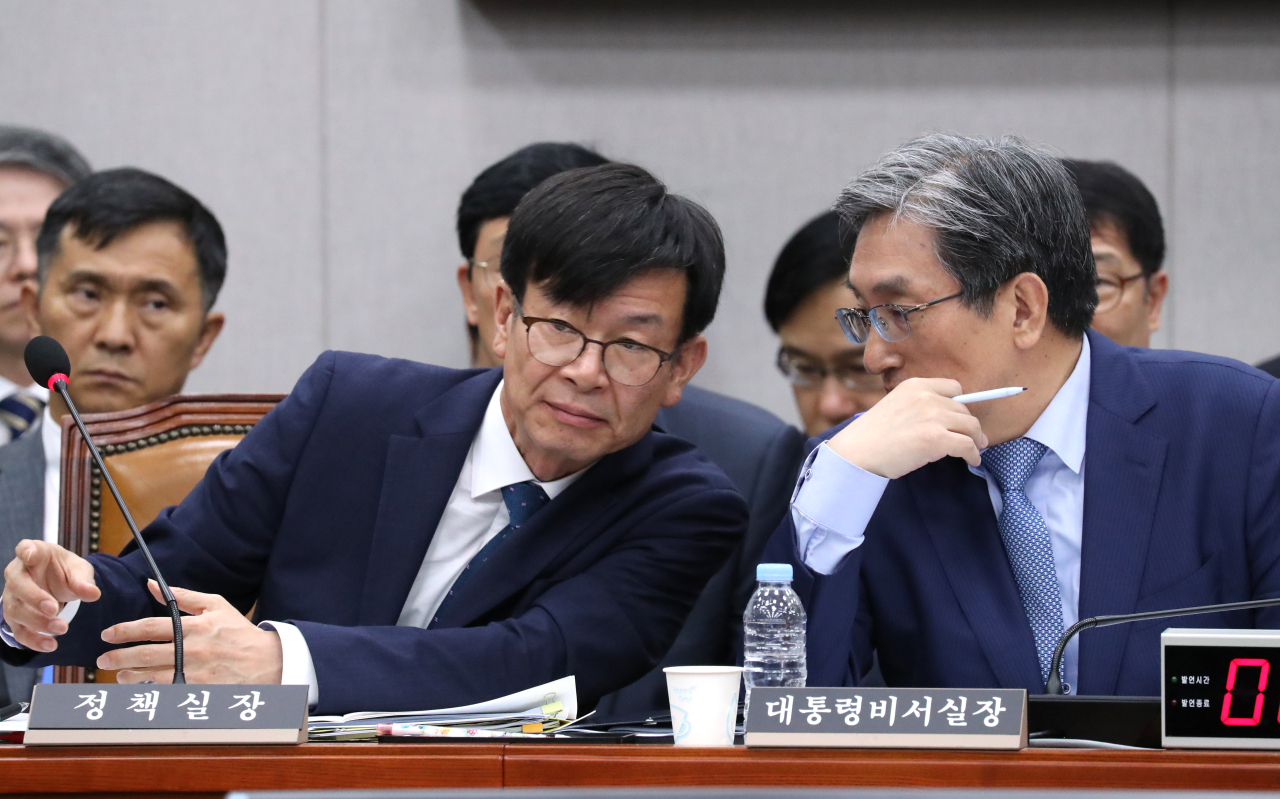Japan unlikely to target Korea’s financial market: state policy chief
By Kim Bo-gyungPublished : Aug. 6, 2019 - 15:46
Kim Sang-jo, the president’s chief of staff for policy, said Tuesday the “possibility is very low” that Japan will target Korea’s financial market for economic retaliation amid thorny relations between the two countries after Japan toughened trade restrictions against Korea.
Asked by Rep. You Sung-yop of the minor progressive Party for Democracy and Peace wither Japan would target the country’s financial market, Kim said, “Compared with the IMF (Asian) financial crisis 20 years ago, the status quo and the fundamentals of our country’s financial (sector) are very different. So the possibility is very low.”
According to Kim, the percentage of Japanese funds in Korea’s capital market, as well as its loans and savings markets, is “very small” compared with the time of the 1997 Asian financial crisis.
He added that a fallback plan would be considered just in case and that the government was keeping tabs on short-term market instability.
Kim Sang-jo, alongside Chief of Staff to the President Noh Young-min and Director of National Security Chung Eui-yong, attended the National Assembly’s House Steering Committee plenary meeting.
Asked by Rep. You Sung-yop of the minor progressive Party for Democracy and Peace wither Japan would target the country’s financial market, Kim said, “Compared with the IMF (Asian) financial crisis 20 years ago, the status quo and the fundamentals of our country’s financial (sector) are very different. So the possibility is very low.”
According to Kim, the percentage of Japanese funds in Korea’s capital market, as well as its loans and savings markets, is “very small” compared with the time of the 1997 Asian financial crisis.
He added that a fallback plan would be considered just in case and that the government was keeping tabs on short-term market instability.
Kim Sang-jo, alongside Chief of Staff to the President Noh Young-min and Director of National Security Chung Eui-yong, attended the National Assembly’s House Steering Committee plenary meeting.

On the expected impact of the economic tensions with Japan on the country’s GDP, Kim put the impact at less than 0.1 percent.
Kim downplayed a forecast by the Korea Economic Research Institute that Korea’s GDP would shrink 4.47 percent as a result of a shortage of key chemicals required to manufacture semiconductors and other products.
Meanwhile, Noh said that for now the future of the General Security of Military Information Agreement, Korea’s military intelligence-sharing deal with Japan, signed in 2016 at the US’ request, was up in the air.
“It is true there are doubts over whether it is right to continue sharing sensitive military information with Japan, which has excluded us from the whitelist, raising security issues and a lack of trust,” Noh said.
“Nothing has been decided, the case is being reviewed. We will take a careful look into it (between now and) Aug. 24.”
Asked if the government had received requests from Washington to refrain from withdrawing from GSOMIA, Noh said “there has not been an official (request).”
He added that Seoul had not asked the US to arbitrate in the matter and did not plan to.
“Rather than using the expression arbitration, it is more appropriate (to say) the US’ interest and involvement,” Noh said.
By Kim Bo-gyung (lisakim425@heraldcorp.com)







![[KH Explains] Hyundai's full hybrid edge to pay off amid slow transition to pure EVs](http://res.heraldm.com/phpwas/restmb_idxmake.php?idx=644&simg=/content/image/2024/04/18/20240418050645_0.jpg&u=20240419100350)






![[From the Scene] Monks, Buddhists hail return of remains of Buddhas](http://res.heraldm.com/phpwas/restmb_idxmake.php?idx=652&simg=/content/image/2024/04/19/20240419050617_0.jpg&u=20240419175937)

![[KH Explains] Hyundai's full hybrid edge to pay off amid slow transition to pure EVs](http://res.heraldm.com/phpwas/restmb_idxmake.php?idx=652&simg=/content/image/2024/04/18/20240418050645_0.jpg&u=20240419100350)

![[Today’s K-pop] Illit drops debut single remix](http://res.heraldm.com/phpwas/restmb_idxmake.php?idx=642&simg=/content/image/2024/04/19/20240419050612_0.jpg&u=)